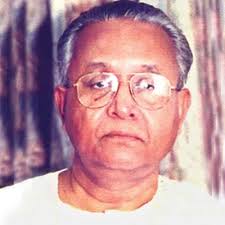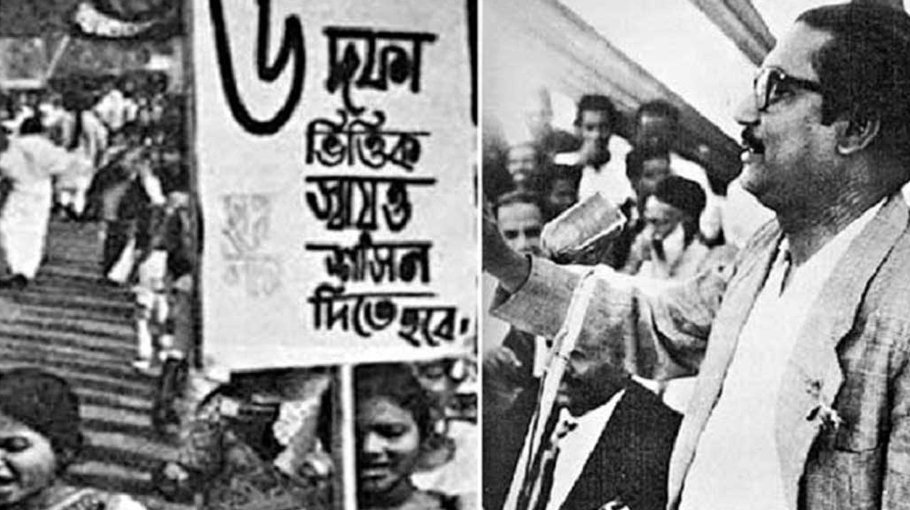Significance of Six-point Movement

If we recall the history of our war of liberation, we should remember the movement of 1952 i.e., the language movement, the election of Jukto Front in 1954, the resistance against the imposition of Martial Law in 1958 by Bangabandhu, the education commission movement of 1962 and the most vital movement of 1966, the six-point movement. In fact, when Bangabandhu was a member of Pakistan Parliament, he often used to raise the disparity between the two wings of Pakistan - East & West. He used to start his speech about the language movement and finish with portraying the disparities. When Bangabandhu along with Hussain Shaheed Suhrawardy, Sher- e- Bangla and Moulana Bhasani went in the campaign of 1954 election they also used to speak about the momentous disparity between East and West. It was the campaign for that election that the 21 points were raised. If we analyze the six-point program of 1966, we would find that many issues of 21 points were incorporated in different forms. So, we may consider the origin of six points movement were the 21 points of 1954. It was Sheikh Mujib alone who framed the six-point through his experience of the movement.
The Six-point programme declared by Bangabandhu Sheikh Mujibur Rahman in a meeting of the opposition parties of Pakistan was in fact a magna carte for the people of East Pakisan. Although the meeting was called for national issue, Sheikh Mujib declared the Six-point programme in that occasion. The aim was to inform the people of West Pakistan that Six-point is the only mean to reduce disparity between two wings of Pakistan and stop transfer of wealth from East Pakistan to West. If one analyses his Six-point programme, he or she would find that Sheikh Mujib gave these points respecting law of the land for stable Pakistan. In his six-point, Bangabandhu raised the most fundamental issue of the Pakistan i.e., the disparity between the two wings- the East and the West under the patronage of the central government controlled absolutely by the Pakistan military Junta. The demand was exclusively to safeguard the interest of the people of East Pakistan. In fact, Sheikh Mujib on behalf of the people of East Pakistan placed the six-point before the people of West in order to serve the interest of the people of East Pakistan. But the ruling clique of the West took it to be a programme of isolation of East Pakistan from the West. They also identified him as the number one enemy of the country. President Ayub Khan replied in the language of weapon.
No other leader of the East had such kind of courage to declare such a programme. The declaration of that programme not only agitated the West but also many people of the East started thinking that Sheikh Mujib wanted to dismantle Pakistan. Parties like Muslim League, the Jamaat and the so-called pro-Pakistani elements started campaigning against Bangabandhu as disintegrator of Pakistan. But the movement launched by Sheikh Mujib gained momentum and got support of 95 percent of the population except a few agents of Muslim League and the religious fanatics i.e., the Jamaat and its stooges. From Teknaf to Tetulia the entire population got inspiration from the programme. The six-point became the magna carte of the East Pakistan.
Meanwhile, the governor of East Pakistan Monaem Khan informed his political father General Ayub Khan about the volatile situation in East Pakistan. General Ayub instructed Monaem Khan to punish Sheikh Mujib. At his order Monaem Khan declared that Sheikh Mujib would not be allowed to see light of the day. Criminal cases were filed against Sheikh Mujib one after another dragging him from one jail to another. No other political leader in the country did suffer so much at the hand of General Ayub Khan as Bangabandhu did. What happened ultimately? Situation was such that an octogenarian village woman waited on the road side lighting her lamp to have a glimpse of Sheikh Mujib who virtually became the absolute leader of the Bangalees. Sensing the grave situation ahead the Pak government lodged the Agartala conspiracy case against Sheikh Mujib.
The idea was to hang him with the charge of sedition centering six-point programme. The trial was held in camera keeping the world outside in darkness. It so happened once while Bangabandhu was taken to the Kangaru court from his cell, he was shot at. But the man who died was Sergeant Zahurul Huq who had some similar appearance with Sheikh Mujib. The aim was to kill Sheikh Mujib. The incidence testifies what kind of trial was going on in the cantonment.
But the situation outside the cantonment was so volcanic that the demand for freeing Sheikh Mujib out of cantonment by physical force became the talk of the day and the students waged movement with the 11-point programme. So the mass movement turned into an explosive situation and the Pak military Junta was compelled to release Sheikh Mujib unconditionally. The next day Sheikh Mujib became Bangabandhu in an unprecedented gathering staged by all party student council. Bangabandhu, the only absolute leader of the people of Bangladesh compelled General Yahya to declare the general election. In 1970 the election was held on the basis of six-point as mandate of the election securing 167 out of 169 seats in East Pakistan. Virtually he became the mouthpiece of the people. Bangabandhu demanded transfer of power to the elected representatives.
The parliament session was called on March 1. In the round table conference Bangabandhu told categorically that he could not alter even coma or semicolon of the six-point as it was the mandate of the people of East Pakistan. The constitution of Pakistan has to be framed to remove disparity between the two wings.
The Pak military Junta had no hesitation to realise what Sheikh Mujib had been aspiring for. The date fixed for parliament session was cancelled. The next day Bangabandhu called for non-cooperation movement. He issued circulars on behalf of the people of East Pakistan. People really obeyed it. In fact the East Pakistan was then ruled by the dictates of Sheikh Mujib. It seemed that the existence of Pakistan was at a stake and Bangladesh became almost an independent country under the leadership of Sheikh Mujib. General Asgar Khan then came to East Pakistan and said “None could save Pakistan except Sheikh Mujib.” He (Mujib) took full control of East Pakistan. It’s a rare phenomenon in the political history that a country was ruled by a leader long before it was born. Sheikh Mujib is probably the only leader in history who did it. The onslaught started on 25th March. In one night they killed some 25 thousand people. Sheikh Mujib just before his arrest declared independent of Bangladesh on the early hour of 26th March.
If we discuss the impact of six-point on our national independence, we must admit that if there was no six-point movement, people could not be united on rock solid unity in the face of the religious sentiment that was prevailing in the country during that time. By declaring six-point programme Sheikh Mujib exposed disparity between the two wings of Pakistan. The people of East realized that only Sheikh Mujib could save the people from the tyrannical rule by the West. Islam had nothing to do with it. The propaganda of the West was that if East Pakistan was separated Islam would be at a stake. But they did say nothing about the disparity.
The people had no problem to understand the essence of six-point programme. So Sheikh Mujib became virtually the emancipator of the people. It was that sort of unity and determination of the people that made our independence a reality and established Sheikh Mujib as the real leader of the Bangalees and the greatest Bangalee that the country did ever produce. He is the father of the nation. He did all that were required to make the Bangalee free from the sub-colonial rule by the Pakistan.
Dr S A Malek is a member of Awami League Advisory Council and President of Bangabandhu Parishad, former political adviser to the Prime Minister, member of parliament and columnist



